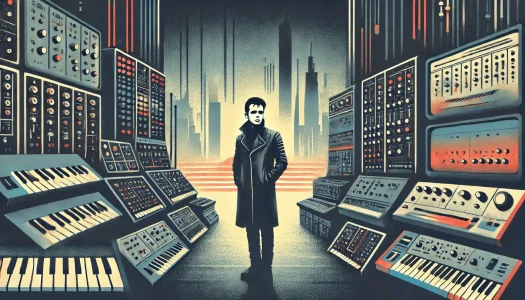Tubeway Army was a British band formed in the late 1970s. They blended punk energy with early electronic sounds. The group quickly gained attention when their single “Are ‘Friends’ Electric?” hit number one on the UK charts in 1979. At the center of this success was Gary Numan. He was the lead singer, main songwriter, and the creative mind behind the music.
Despite the band’s rising fame, Numan soon left Tubeway Army behind. But this wasn’t a break-up in the usual sense. Instead, it was a shift in how he presented his work. We explore the real reasons why Numan stepped away from the band name and chose to go solo under his own name.
Formation and Rise of Tubeway Army
Tubeway Army formed in London in 1977. The original lineup included Gary Numan (then still going by his birth name, Gary Webb) on vocals and guitar, his uncle Jess Lidyard on drums, and bassist Paul Gardiner. At first, the band followed a punk rock sound, which matched the mood of the time.
Over time, their music began to shift. Numan became fascinated with synthesizers, especially after stumbling upon a Minimoog in the recording studio. This discovery would change everything. He started blending punk rhythms with cold, electronic textures, creating a sound that felt both futuristic and alien.
Their big break came in 1979 with the release of “Are ‘Friends’ Electric?”. The song was unlike anything else on the charts. Its robotic vocals and eerie synth lines stood out. It reached number one in the UK and brought Tubeway Army mainstream attention.
From the start, Gary Numan was the band’s driving force. He wrote the songs, shaped the sound, and handled the vocals. In many ways, Tubeway Army was already more his personal project than a traditional group. This strong creative control set the stage for what came next.
Creative Control and Artistic Vision
Gary Numan quickly became the sole creative force behind Tubeway Army. He wrote all the songs, handled the vocals, and played a growing number of instruments on their records. As he explored new ideas, he also took on a bigger role in the production process. This level of control meant the band’s sound reflected his personal vision more than a group effort.
As Numan’s focus shifted toward electronic music, the dynamic within the band changed. While there’s little public record of major conflict, it was clear that the group functioned more as Numan’s backing band than a full partnership. The other members had less input, especially as synthesizers and drum machines began to take center stage.
The sound moved sharply away from punk. Numan leaned into cold, sci-fi-inspired synth textures and robotic vocal styles. This new direction became the foundation of his music going forward. It was a bold move, and one that didn’t leave much space for traditional band roles.
The Name Change and Solo Move
After the success of “Are ‘Friends’ Electric?” in 1979, Gary Numan made a clear choice: he would release his next album under his own name. The Pleasure Principle, released later that year, marked the official shift from Tubeway Army to Gary Numan as a solo artist.
This wasn’t a typical band break-up. The musicians who played on The Pleasure Principle were mostly the same as before. The real change was in the branding. Numan understood that he was the main creative force. Using his own name made it easier to take full credit for the music and control his image.
There may have been some pressure from the industry to push Numan as a solo star, especially after his rapid rise. But the decision was also practical. It allowed him to move further into experimental sounds without being tied to a band identity. In short, it was a strategic move — not an end, but a rebrand.
Closing Thoughts
Gary Numan’s decision to leave Tubeway Army wasn’t about conflict or collapse. It was a calculated move driven by three key factors: his need for full creative control, a desire to shape his personal brand, and a clear vision for his artistic evolution.
By stepping out under his own name, Numan positioned himself to push boundaries without compromise. The band may have faded, but his career was just beginning. His departure from Tubeway Army wasn’t an end — it was the start of something much bigger.
